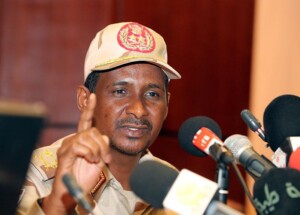FM Hamdok announces mechanism ‘to protect Sudan’s transition’
Prime Minister Abdallah Hamdok yesterday announced the formation of a mechanism “to create a broad consensus” for the implementation of his initiative to protect the country’s transition to democracy.
 PM Abdallah Hamdok speaking at the Council of Ministers (File photo)
PM Abdallah Hamdok speaking at the Council of Ministers (File photo)
Prime Minister Abdallah Hamdok yesterday announced the formation of a mechanism “to create a broad consensus” for the implementation of his initiative to protect the country’s transition to democracy.
In a press conference at the Council of Ministers on Sunday evening, Hamdok said that the mechanism was formed after wide consultations, in order “to reflect diversity and express the richness of the political arena”.
The goal of the mechanism, to be chaired by Maj Gen Fadlallah Burma (Retd), President of the National Umma Party (NUP), is “to represent the largest number of Sudanese society and its various sectors”. It will be “a body that seeks to achieve the greatest degree of consensus within Sudanese society” during the country’s transition to democracy.
The transition period is set on 39 months, after which general elections will be held. The start of the period was postponed from August 17, 2019, when the Constitutional Charter was signed by the military and the Forces for Freedom and Change, to October 3, 2020, the date of the signing of the Jube Peace Agreement by the Sudanese government and a number of rebel movements.
‘Way out’
Two months ago, Hamdok announced the initiative National Crisis and Transition Issues – The Way Forward, “to find a way out of the national crisis and issues of democratic transition” in Sudan.
The initiative contains proposals to implement the goals of the Sudanese revolution, solve the economic and political crises in the country, develop a clear a national programme to unify the transitional bloc, and achieve a comprehensive peace by expanding its base.
“The decision-making centres in Sudan should work according to a common vision” on “a civil, democratic system of government based on equal citizenship and free and fair democratic elections,” he stated at the time. The various political actors should therefore “reach the largest possible consensus" on the tasks to be implemented during the transitional period.
The PM stressed the need to implement the Juba Peace Agreement, “a major element of the transition,” signed in October last year.
The government should also “directly, through an agreed timetable” start with the process of forming “a single, professional and national army in a manner that reflects Sudan’s unique diversity”. In addition, the General Intelligence Service (GIS) and the Sudanese police must implement the stipulations in the 2019 Constitutional Charter, and “undergo a process of deep, radical and urgent reforms”.
Dialogue
The initiative is meant as a road map forward because of the lack of success in creating a national project, Hamdok explained yesterday.
His proposal has been subjected to “a detailed dialogue with Sudanese inside and outside the country”, he said. “It belongs to the Sudanese people and they have the right to add or delete parts”. He added that the proposal was also discussed with the international community, “and all the responses were positive”.
The PM further said that what bothers him the most are the people’s poverty and the need to set affordable prices.
As for the delayed formation of the Parliament, he said that “if the various political forces show the necessary political will, I am convinced that a Legislative Council can be established”.
Last year, in April, Hamdok launched another initiative, Stand Up for Sudan, that aimed “for a collective national contribution from Sudanese people to help Sudan overcome the economic difficulties. Together we defeated the dictatorship and thus, together we can rebuild the country.” Though political actors described the idea as the right move to boost the Sudanese economy, no follow-up has been recorded.











 and then
and then